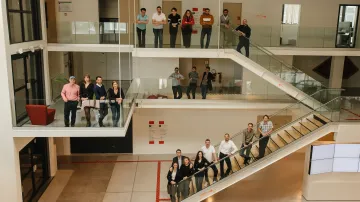
QUOBLY
À propos de votre organisation / profil
Quobly, founded in Grenoble, France in 2022, is developing a fault-tolerant quantum processor. Quobly’s breakthrough innovation leverages the same proven technologies used to produce classical processors to fabricate qubits, or quantum bits, the basic unit of information in quantum computing. This represents a huge step forward from early quantum prototypes. Fault-tolerant quantum computing requires millions of qubits. Quobly has mapped out a viable path toward manufacturing them in Europe’s existing semiconductor plants.
Quobly is a spin-out from CEA and CNRS, building on over 15 years of collaborative research. Our team has made seminal contributions to quantum computing and semiconductor technology fields. We discovered how to turn transistors into high-quality qubits. Quobly has strategic partnerships with the best of Europe’s high-tech industry and scientific excellence. Our team combines scientific excellence with industry expertise. We feel as comfortable characterising quantum systems as we are negotiating large commercial agreements with industry. The company was launched by three co-founders, Maud Vinet, CEO, Tristan Meunier, CTO and François Perruchot, COO, and we are assembling a stellar team to take on the next challenges.
Quobly announced on July 12th 2023 that it completed its first funding round of €19 million.
Quobly’s name (the company used to be Quobly) stands for “Quantum” and “Grenoble,” it symbolizes the historically strong ties between quantum research and development and the semiconductor industry in Grenoble.
To deliver on the promise of quantum computing, we must find a way to build machines with large numbers of high-quality quantum bits and have the means to precisely control them at scale. Currently, various physical platforms are being used to build qubits each facing its own set of trade-offs. The question that the industry must tackle is how to square these trade-offs with long-term scalability targets. One can draw parallels between the current state of quantum computing and that of classical computing before the advent of transistors, when bits were encoded in a variety of physical systems: electro-mechanical bombes, electrical switches, vacuum tubes, etc.
The most mature qubit platforms are superconducting circuits and atoms, charged or otherwise. The former is the platform of choice for large incumbents like IBM, Google, and AWS. The latter is the technology used by prominent new entrants like Quantinuum, Pasqal, AQT, PlanQC and IonQ. There has been enormous progress using these methods. But whether we could use these approaches to assemble quantum computers with 100k or 1000k high-quality qubits remains open.
Silicon (Si) technology was the key for unlocking scalability in classical computing. Quobly is leveraging it to play a similar role in quantum computing. Indeed Si-qubits have several attractive features: they display low footprint (~100nm²), fast operations (~usec), high-fidelity single- and two-qubit gates (>99%) and have moderate temperature requirements for operation (~1K). Moreover, Si-qubits can rely on a mature industry, which has mastered the intricacies of scaling. This could prove critical in overcoming the challenges of variability and large-scale control that have plagued mainstream approaches so far. Furthermore, research has shown that it is possible to integrate qubits and control electronics on the same chip. This could be a great asset to control large arrays and implement quantum error correction protocols.
Réseau (0)
Il n'y a pas encore d'organisations dans le réseau.



